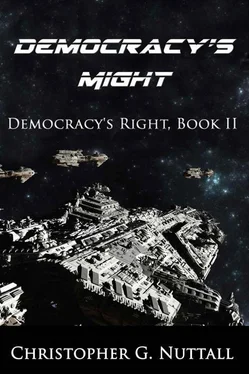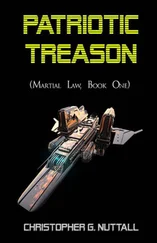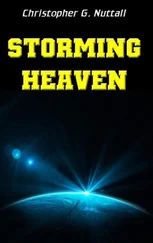“And then I need a few words with the Admiral too,” he said. “I want to know which side he’s on.”
Colin had not been taught to have respect for senior officers. Most of the Imperial Navy’s officers were appointed for loyalty, connections or incompetence, not anything Colin could have respected them for possessing. Even before Percival had betrayed him, Colin had never really respected him. The man’s flaws had been too obvious, even to someone who had hoped to use him for his own advantage.
But Admiral Wachter was different. Colin hesitated outside the hatch, feeling an odd mixture of nervousness and admiration. If he’d served under such a man, he had asked himself, would he have ever been driven to mutiny? And, if he had never been driven to mutiny, would the Empire just have continued expanding outwards until it collapsed under its own weight? Would no one have stood up and said enough ?
He pressed his hand against the sensor, opening the hatch. The Marine guard nodded at him, then stepped aside as the hatch opened, allowing Colin to step into the compartment. It had once belonged to one of Stacy Roosevelt’s aides — Colin had never been entirely certain what the man had done for her, but he’d accepted exile with almost indecent speed — and had been swept of anything that might be dangerous or valuable. But at least it wasn’t a cell in the brig, Colin told himself, as Admiral Wachter sat up on the sofa. It could have been a great deal worse.
“Commander Walker,” Wachter said.
“ Admiral Walker,” Colin countered, recognising the verbal gambit. To let it pass would be to implicitly recognise the Empire as the source of all promotion. “I trust that the quarters are acceptable?”
“It would be nice to have something to read,” Wachter said. “Your people took out the workstation and everything else.”
“I’ll have some books dug up and sent to you,” Colin assured him. He took a seat facing the sofa and smiled at Wachter. “You fought well.”
“Thank you,” Wachter said. “So did you.”
Colin glanced up as the hatch leading into the bedroom opened, revealing a woman with long blonde hair and a face that seemed oddly nervous. It reminded Colin of the poor bastards they’d rescued from Imperial Intelligence, back when Camelot had fallen. They’d twitched nervously too after spending months having the Mind Techs probing their brains. The woman, according to the files, was the person Admiral Percival had chosen to replace him. It didn’t look as though she had enjoyed the experience.
She sat down next to Wachter and stared at Colin, unable to quite meet his eyes. Colin smiled, inwardly. She might not know it herself, but she had one hell of a crush on the Admiral, even though they weren’t orienting on one another like lovers. Nor was she cringing away, as she might well have done for Percival. Somehow, Colin doubted that it was love that had lured her into Percival’s clutches. More like intensive pressure to open her legs for the man who could save or damn her career with a single word.
Bastard , Colin thought. But Percival was on a penal world, assuming he had survived. Colin wouldn’t have put money on him surviving more than a few days. There was no point in dwelling on his fate.
“We won the battle,” he said, shortly. “It is our intention to move on to Earth as soon as we have patched up the damage.”
Wachter said nothing. Nor did his aide.
“I have a question,” Colin said. “Why are you loyal to the Empire?”
“The Empire is not perfect,” Wachter said. “But what would happen to humanity without it?”
His voice was calm and reasonable. “There would be chaos,” he said. “Old disputes would lead to civil war, the economy would fragment, the Imperial Navy would be broken up… no, we need the Empire.”
“But the Empire has committed millions of atrocities to keep its power,” Colin pointed out, struggling to keep his voice calm. “Lives have been ruined just for daring to question the way things are. People have been destroyed merely for being in the wrong place at the wrong time.”
He remembered Hester and shuddered. She’d been captured, abused, raped and then sentenced to a penal colony, just for daring to seek independence for her homeworld. And her story was far from unique. God alone knew how many people had been killed by the security forces, or sentenced to penal worlds and abandoned to die there. Hester had merely been lucky enough to be rescued before she could be dropped to the surface. And then there were the independent worlds that had been swept out of existence because the Empire wanted their land. What had Jackson’s Folly done to deserve being annexed by the Empire?
Wachter looked down at the deck for a long moment. “I didn’t say the system was perfect .”
Colin indicated Penny. “And what about her?”
He pressed on before Wachter could say a word. “She had nothing to do with the mutiny or Admiral Percival’s ham-handed response,” he said. “But she was still interrogated badly, just so they could find a scapegoat for the whole affair. What did she do to deserve that ?”
“Nothing,” Wachter said. He met Colin’s eyes, holding them. “And what is the point of this discussion?”
“Join us,” Colin said, simply.
“To destroy the Empire?”
“To reform it,” Colin said. “The Empire is dying — it was dying even before I launched the first mutiny. You know that to be true, I think. The Thousand Families were running out of worlds to annex, their economic system was threatening to collapse and they were starting to turn on each other. It might have fallen apart completely by now if I hadn’t given them a common enemy. Even if we were to surrender tomorrow, the Empire wouldn’t survive the next few decades.”
“A lot can happen in a decade,” Wachter pointed out, smoothly.
“Not in the Empire,” Colin said. “The Thousand Families will start fighting each other; their subordinates will start considering how best to take advantage of the chaos. Worlds will struggle for independence, independent freighters will seek to replace the authorised shipping lines. All of the Empire’s victims, the abused and exploited, will rise up and demand their freedom. The Empire will rip itself apart.”
He leaned forward. “You have a point,” he admitted. “Humanity’s unity is important. But, right now, there is no unity left. The Empire holds the human race together by force. Sooner or later, that force will prove insufficient to handle the task.
“We can reform the Empire if we take power now,” he insisted. “End the worst of the abuses, reform the economy, purge the Imperial Navy of the patronage networks that prevent competent and far-seeing officers from rising to positions of authority… we can save humanity’s unity. But if we fail to reform the Empire, the results will be disastrous for humanity.”
“You’d weaken us,” Wachter pointed out.
“We’re already weak,” Colin countered. “Tell me something. What do you think would happen if we ran into a peer power, now ?”
He saw Wachter’s wince and smiled, inwardly. The Empire had no peer, not since the First Interstellar War. Their last war with an alien race had been almost pitifully small compared to the First Interstellar War — or Colin’s rebellion. But if the Empire had run into a peer power, one that actually maintained its starships, the war would have been lost very quickly. There would have been no time to repair the effects of years of stagnation on the Imperial Navy…
Colin had read the reports from Morrison. If the rebels had attacked the planet with a squadron of superdreadnaughts, just after the start of the rebellion, they might well have won outright. The same could be said for Earth. Wachter had worked miracles in getting the Morrison Fleet up and running, even though it had earned him the hatred of almost all of the patronage networks. But if the Empire had run into a peer power, the results would have been disastrous.
Читать дальше












